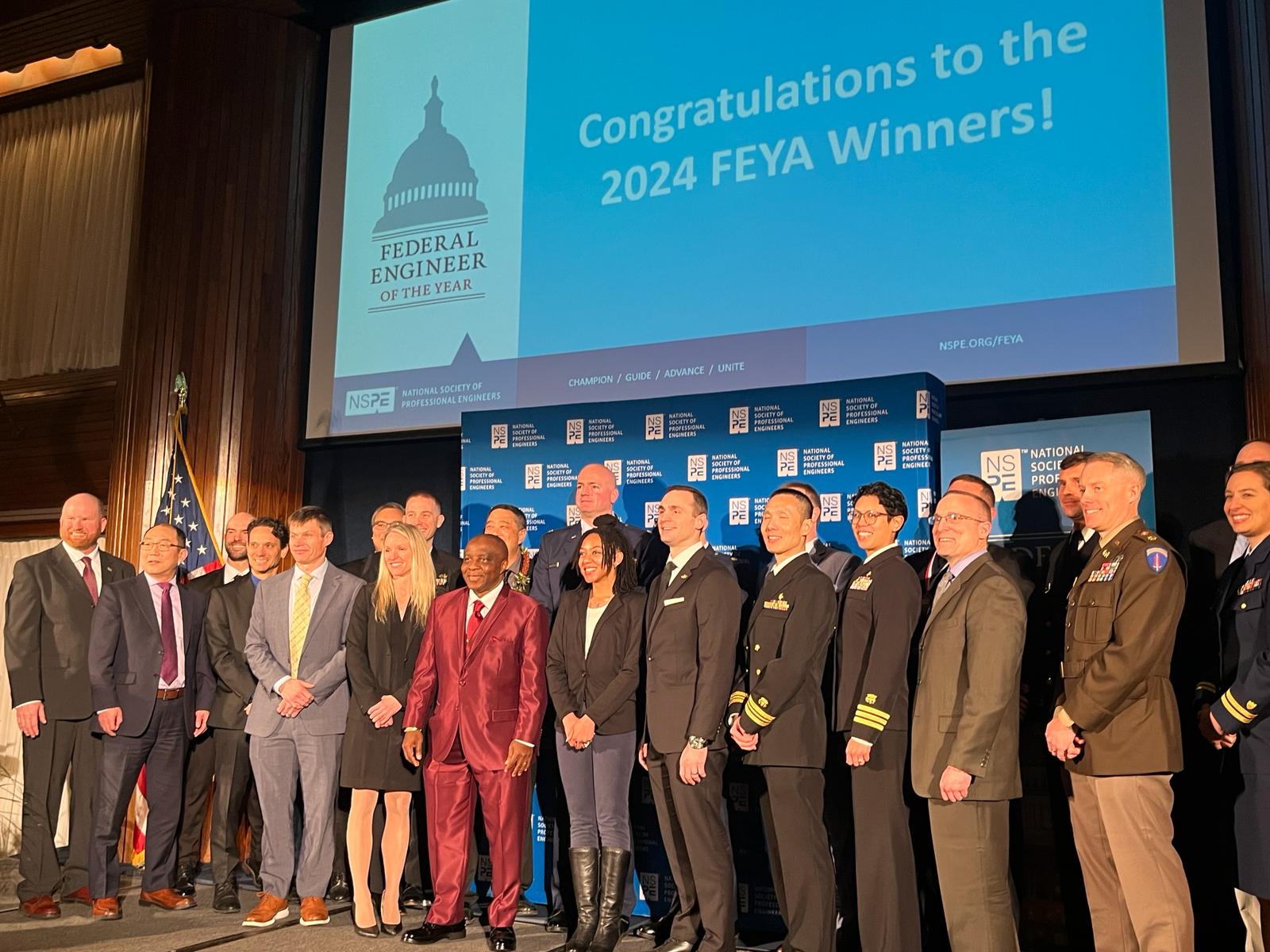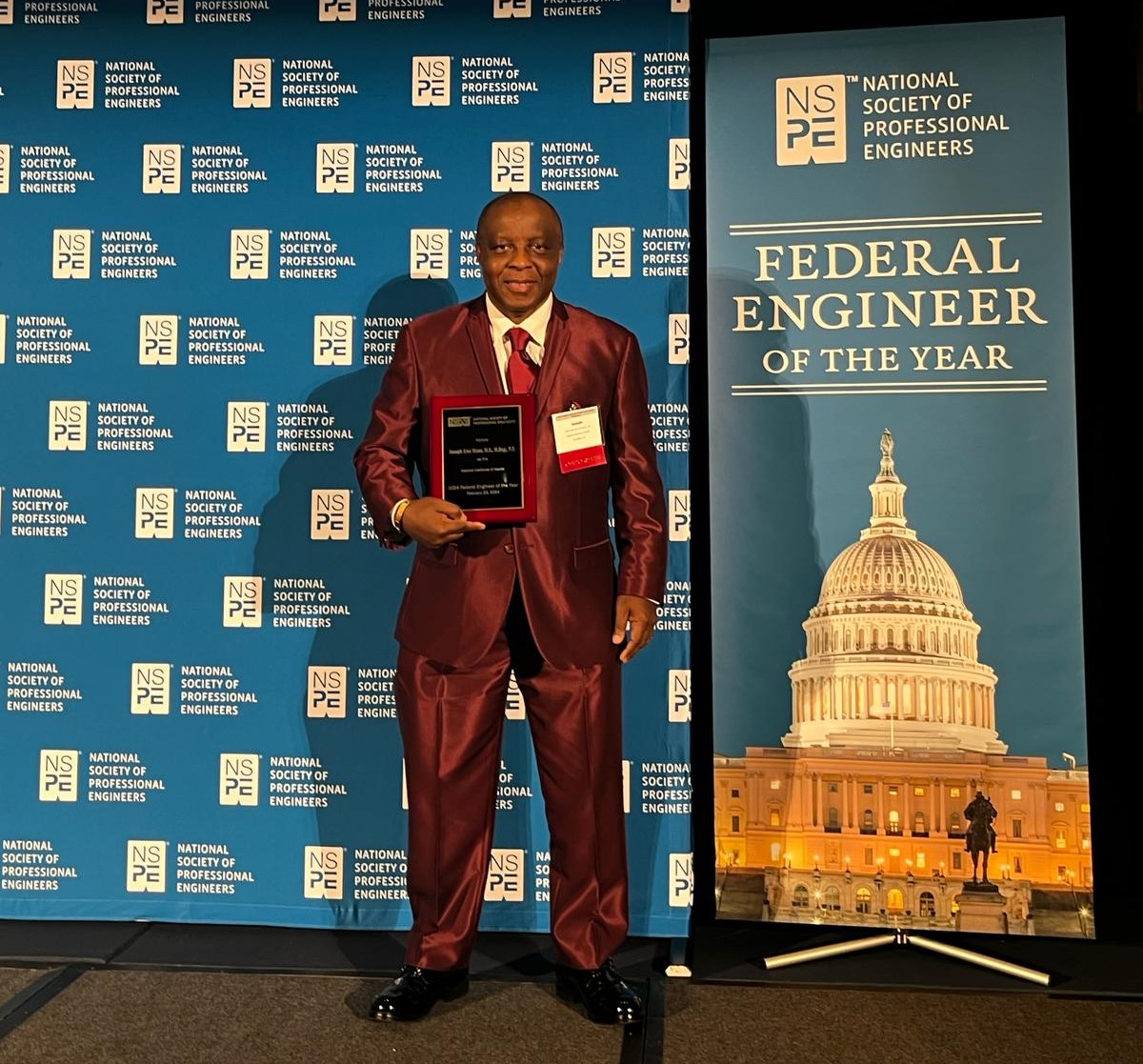Joseph Alex Musa, MSCE (HU), P.E, a Sierra Leonean is fast becoming a household name in the highest Professional Engineering body in the United States of America. As one of the top ten chosen, Mr Musa competed for the 2024 Federal Engineers of the Year Award (FEYA) and was chosen as The Engineer of the Year, for the National Institutes of Health this year. As a Howard University Alumnus, Mr Musa was nominated by Robert E. Efimba, Sc.D. (MIT), P.E (MD), Associate professor of Civil Engineering at Howard University. This year’s award ceremony was held at the National Press Club in Washington, D.C on Friday, February 23, 2024. Mr Musa, who works for the National Institutes of Health has become a member of a select group of the National Society of Professional Engineers (NSPE). As an Environmental Engineer at the National Institutes of Health (NIH) for over a decade, he served as the Program Manager for the air emissions program and environmental issues pertaining to the Clean Air Act at the Bethesda campus in Maryland.

Mr. Musa graduated from Fourah Bay College, (FBC) the University of Sierra Leone in 1989. Upon graduation from FBC where he was fondly known as “J-Mus”, he worked with the Ministry of Water Resources as a Senior Water Engineer and Regional Engineer in various regions, including Kono District and the Southern province in Sierra Leone from 1989-1991. Working with the British Water Aid Project and UNDP, he was heavily involved in the rehabilitation of the water supply in Koidu and Njaiama Nimikoro townships following which, he earned a German government -sponsored scholarship to pursue a master’s degree in water resources in Germany, where he completed a double master’s degrees in environmental engineering in 1993. He returned to Sierra Leone and worked with several NGOs in one of the largest camps of displaced people in Gondama at the time, before emigrating to the USA in 2000. Working in between jobs as an electronic warehouse assistant, supervisor, and security personnel, Mr. Musa later completed another master’s degree in environmental civil engineering (major) in from Howard University in 2008.
After leaving his traumatic experience of the war behind him, the experience did not dampen his humane spirit. Rather, it emboldened and fuelled his passion to make a difference. He recalled a TV newscast that caught his eye one day, during which the ongoing atrocities and humanitarian crisis in DRC then was splashed across the world in all its gory glory. That became his lightbulb moment, following which he was sent to Amsterdam after a successful interview with DWB, the American service branch of Medicins Sans Frontières (MSF) in the New York headquarters. With a repertoire of languages including Swahili, English and German in his linguistic arsenal, Musa was fairly equipped to navigate his way through the linguistic gymnastics of those regions in 2002. That was when he decided to offer his services to these regions that were ravaged by civil war and unrest. With news about several attacks on Aid workers, which was highlighted when five MSF aid workers were ambushed and killed by Afghan insurgents in July 2002, his decision to venture into such hostile environments as an aid worker was viewed by many close to him as suicidal at the time.
Mr. Musa worked in some of the most dangerous countries with some of the worst sanitary conditions at the time. These regions included the Democratic Republic of Congo (DRC), Burundi and regions bordering Rwanda, which were plagued by internecine civil and external wars. As an environmental engineer working with one of the most dedicated humanitarian aid organisations like Doctors Without borders (DWB) fondly known as “angel workers”, he was tasked with the job of restoring and implementing safe sanitation programmes in areas that had no semblance of drainage systems. Against the backdrop of gunshots, sporadic attacks, and cross border shootouts, his daily routine required him to restore drainage and implement sanitation systems that were clogged with used needles, syringes, sanitary pads, scattered placentas etc around the hospitals in DRC, Burundi, and the edge of Rwanda.

With these areas that became favourite playgrounds for children and inherent breeding grounds for diseases like malaria, typhoid and other tropical diseases, intermittent outbreaks were inevitable, as the contaminated water from these hospitals made their way to the people who used it for their daily activities. Mr Musa worked tirelessly to improve the insurmountable teething sanitation and hygiene problems, by restoring and implementing safe sanitation and waste management systems at the time. Notwithstanding the horrendous sanitary conditions and military activities at the time, Musa recalled that his experience in working in war ravaged Sierra Leone, where he dealt with victims, mostly children, women and the elderly who had suffered from horrendous barbarity and unimaginable suffering had paradoxically strengthened his resolve and passion “to make a difference in people’s lives”. He recalled that seeing the starving, the dying and gruesome suffering of his people at such an early stage of his career provided him with the oxygen that fuelled his passion and motivation. He always pointed to his faith and prayers as one of his strongest suits in those situations.
During a recent sojourn to Burundi, he fondly remembered his encounter with the people. He remembered the smiles, the gratitude, and the good wishes he received when he bumped into some of the locals he once worked with during those turbulent times. “This is the man who rehabilitated our hospital” still rings in his ears to this day. He continues to find strength from the spirit and gratitude of those he helped in the past.
Mr. Musa ranks as one of the shining lights flying the Sierra Leonean flag on the international stage. In a relatively short space of time, he has exceptionally excelled in the engineering field. His career includes working with internationally acclaimed organizations like the International Rescue Committee (IRC), Catholic Organization for Relief and Development Aid (CORD-AID) and many others. His nomination by prominent luminaries like Robert E. Efimba, Sc.D. (MIT), P.E (MD), Associate professor of Civil Engineering at Howard University, to contest and win the 2024 Engineer of the Year 2024 of the National Society of Professional Engineers (NSPE) is testament to his dedication, fortitude, and enviable brilliance of someone I was lucky to share the same Alma Mata and 0-1-0 gastronomical equation with.
Mr Musa (J-Mus) remains the same humble and shy person who would not thank me for this. Unfortunately for him, some of us will continue to clap for others until it’s our turn. Congratulations on your achievements and may Allah continue to grant you fulfilment in all your endeavours. Thanks for flying the flag for an award well deserved.
Don’t forget to turn the lights out when you leave the room.


What a remarkable achievement from an unassumed academic in the personality of Eng.Joseph Musa who has made us extremely proud as Sierra Leoneans by helping to keep the country’s flag extraordinarily high on the international stage. Few Sierra Leoneans, if any, can match his achievements both at the national and international arena. He deserves all our accolades and respect in this respect. We pray that God in His infinite wisdom will continue to guide him through and through for more greater achievements in the Engineering field that would help uplift the image of our country globally. Bravo to him!!!
Zozoh, thank you very much for a well written article about my professional career in Engineering. You said it all! You brought back lots of memories, working in those unsafe environments, which were risks and sacrifices made to provide humanitarian services to the people. The 0-1-0 formula prepared us to face those challenges. Thanks Bro
Congratulations Mr J. Musa we are proud of you, Sierra Leone can use your expertise
Thank you